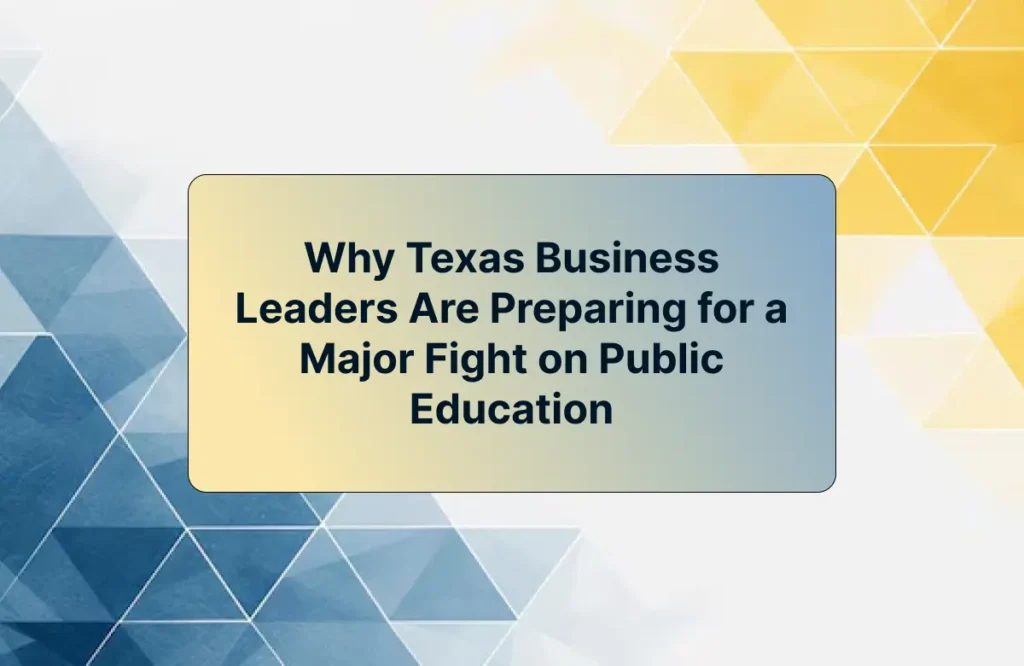When the Texas Legislature reconvenes in Austin next month, an unexpected group of allies will be advocating for the public education system: the state’s business leaders. Historically focused on economic policies and job creation, this coalition is now stepping into the education debate, motivated by concerns about the future workforce.
Despite its reputation as a pro-business state, Texas ranks among the bottom 10 states in the U.S. for education spending per student, falling $4,000 below the national average. This alarming gap has not narrowed since the state last adjusted its basic per-student funding in 2019.
For businesses that rely heavily on local talent, this trend has become a pressing issue. It’s no longer just about education—it’s about ensuring a skilled workforce for tomorrow.
Business Leaders Speak Out
At a recent forum hosted by the nonprofit Bexar County Education Coalition (BCEC), leaders from major business organizations like the Greater San Antonio Chamber of Commerce and Toyota Motor Manufacturing Texas voiced their concerns.
“The majority of our production talent is homegrown,” said Susann Kazunas, president of Toyota Motor Manufacturing Texas, which operates a major plant in San Antonio. “Quality requires intentional investment, and that’s what our public school system desperately needs right now.”
Kazunas emphasized the importance of public schools in shaping the workforce that powers local economies. “We have a stake in what’s happening in classrooms across Bexar County,” she said, highlighting Toyota’s investment of $50 million over two decades in local education initiatives.
Public Education at a Breaking Point
The funding shortfall has forced school districts to make tough decisions. Many have closed campuses, laid off staff, and cut programs to balance budgets. Major infrastructure projects have also been put on hold.
Last year, there was hope for a significant increase in education funding. However, efforts were derailed when Governor Greg Abbott tied the funding to the introduction of a school voucher program—a proposal that allows parents to use public funds for private school tuition and other education-related expenses.
This year, business leaders are determined to push for change. At the BCEC forum, Brett Finley, CEO of the Metro San Antonio Chamber, acknowledged the challenges ahead. “We’re not naive enough to believe public education isn’t under attack in Texas,” he said. “It’s going to be one heck of a fight.”
A Unified Business Agenda
Local business groups are focusing their lobbying efforts on “fully funding” public schools and increasing teacher salaries. While some organizations are preparing for the potential approval of school vouchers, they are advocating for accountability measures to ensure taxpayer dollars are spent responsibly.
Mario Barrera, chairman of the Greater San Antonio Chamber of Commerce, pointed out that while school vouchers may be inevitable, the real challenge lies in ensuring they don’t undermine the public education system. “The question becomes: In what format? What kind of accountability or metrics are going to be attached to it?”
Educators at the event appreciated the support from the business community. Fort Sam Houston ISD Superintendent Gary Bates emphasized the shared goal of educating all children. “Everyone under this roof may have differences of opinion, but what bonds us is our commitment to students,” he said.
The Business Case for Public Education
For businesses like Toyota, investing in education is about more than altruism—it’s a strategic necessity. The company’s manufacturing plant in San Antonio employs 3,700 people, 80% of whom only need to pass a basic skills assessment. Yet, the surrounding area is economically disadvantaged, with low educational attainment levels.
To address this, Toyota has directed significant resources toward STEM education, workforce development, and partnerships with local school districts. Kazunas stressed that such investments are essential for building tomorrow’s workforce.
Business leaders are now calling on the state to do its part. They argue that diverting public funds to private schools through vouchers could jeopardize the public education system, which is uniquely positioned to educate all children, regardless of background or ability.
A Call to Action
Kazunas concluded her address with a rallying cry for collective action. “As a parent, you want your kids to grow and contribute to society. Public schools are best positioned to set them up for success,” she said, urging attendees to support local chambers and advocacy groups like the BCEC.
The stakes are high, and the fight for public education in Texas is just beginning. With the backing of influential business leaders, the debate over funding and the future of public schools promises to be a pivotal issue in the upcoming legislative session.
The Bigger Picture
This alliance between the business community and public education advocates marks a significant shift in the conversation about education in Texas. By framing the issue as critical to the state’s economic future, business leaders are bringing a new sense of urgency to the table.
Their involvement underscores the idea that investing in education is not just a moral obligation but a smart economic strategy. After all, the success of Texas’ workforce—and its businesses—depends on the strength of its public schools.
As the legislative session approaches, one thing is clear: this will be a defining moment for the future of education in Texas. The question is whether lawmakers will rise to the occasion and prioritize the long-term success of students, businesses, and the state as a whole.









1 thought on “Why Texas Business Leaders Are Preparing for a Major Fight on Public Education”